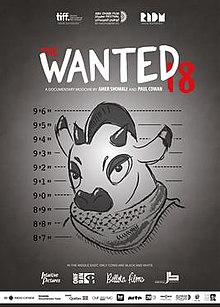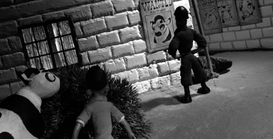The Wanted 18
| The Wanted 18 | |
|---|---|
 The Wanted 18 official poster | |
| Directed by | |
| Produced by |
|
| Cinematography | Daniel Villeneuve, Germán Gutierrez |
| Music by | Benoit Charest |
| Distributed by | National Film Board of Canada |
Release date |
|
Running time | 75 minutes |
| Countries | Palestine, Canada, France |
| Languages | Arabic, English, Hebrew |
The Wanted 18 (Arabic: المطلوبون 18, romanized: al-maṭlūbūn 18) is a 2014 Palestinian-Canadian animated documentary about the efforts of Palestinians in Beit Sahour to start a small local dairy industry during the First Intifada, hiding a herd of 18 dairy cows from Israeli security forces when the dairy collective was deemed a threat to Israel's national security. The film combines documentary interviews with those involved in the events, archival footage, drawings, black-and-white stop-motion animation as well as re-enactments, and was co-directed by Canadian filmmaker Paul Cowan and Palestinian visual artist and director Amer Shomali.[1] The film was the Palestinian entry for the Best Foreign Language Film at the 88th Academy Awards but was not nominated.[2][3]
Background
[edit]In the 1980s, as part of a Palestinian boycott of Israeli taxation and commodities, residents of Beit Sahour decided to form a collective and stop purchasing milk from Israeli companies, in a quest for greater self-sufficiency. They purchased cows from a sympathetic kibbutznik and set about teaching themselves how to care for the animals and milk them—even sending a member to the United States to learn dairy farming. The farm was a success, with strong local demand for “Intifada milk.”[1][4][5][6] Despite the fact that the cows posed no serious economic threat to Israel, they were determined to be part of the boycott of Israeli administration, and hundreds of soldiers as well as military helicopters were used to search for the cows. The popularity of the cows increased support for the tax boycott, causing headaches for occupying forces.[7]
Animated sequences and visual style
[edit]
The film is framed as being told from the point of view of the cows—Rikva, Ruth, Lola and Goldie, who appear in humorous Claymation animated sequences.[4][6] The filmmakers intended The Wanted 18 to have a comic book feel, even shooting live-action interviews at an angle to replicate the look of comic book panels.[5] The director intended to use the cows point-of-view as a way for audience to sympathize with the subject matter. For Shomali, laughter is a way of non-violent disobedience.[8]
Production
[edit]The idea for the film began in Shomali's boyhood, spent largely at a Syrian refugee camp where his main escape had been reading comic books, one of which dealt with the story of the Beit Sahour cows. Montreal-based producer Ina Fichman first heard of the story when a group of producers and broadcasters at a documentary-pitch event Ramallah. Shomali's original intention had been to make a short animated film on the story. However, Fichman believed it had the makings of a feature documentary and approached veteran Montreal-based documentary filmmaker Paul Cowan. The project took nearly five years to complete—a lengthy process due to the time involved in creating the animation as well as the fact that Shomali and his Canadian collaborators lived thousands of miles apart.[5]
Interviewed in the film are Jalal Oumsieh, a schoolteacher who had purchased the 18 cows, geology professor Jad Ishad, pharmacist Elias Rishmawi and butcher Virginia Saad. The film also interviews two members of the Israeli government: Shaltiel Lavie, then-military governor of the region, and Ehud Zrahiya, his Arab affairs adviser.[6]
The film score is composed by Benoît Charest. The Wanted 18 is a co-production of Intuitive Pictures, the National Film Board of Canada, Bellota Films, Dar Films Productions, ARTE and 2M (see credits-end of documentary). The producers are Fichman and Nathalie Cloutier.[1] The film received funding from the Beirut-based Arab Fund for Arts and Culture (AFAC).[9] and from SANAD, Abu Dhabi film festival.
Release
[edit]The film had its world premiere at the 2014 Toronto International Film Festival and was screened to a capacity crowd in Ramallah.[1] Other festival screenings as of the fall of 2014 include the Abu Dhabi Film Festival, where the film received the award for Best Documentary from the Arab World,[10] the Rencontres internationales du documentaire de Montréal,[5] as well as the 2014 Carthage Film Festival, where the film received its Golden tanit for best documentary film. In 2015, it won Traverse City Film Festival Best Documentary award.[citation needed]
Controversy
[edit]The film's director Amer Shomali was unable to attend a screening of the film at the Human Rights Watch International Film Festival in New York City when he was denied entry to Jerusalem by the Israeli government on the grounds that he was a security threat, and was therefore unable to attain a U.S. Visa.[11]
Reception
[edit]On review aggregator Rotten Tomatoes, the film holds an approval rating of 69% based on 13 reviews, with an average rating of 5.86/10.[12] On Metacritic, the film has a weighted average score of 59 out of 100, based on 6 critics, indicating "mixed or average reviews".[13]
Accolades
[edit]| Award | Year | Category | Result | Ref(s). |
|---|---|---|---|---|
| Abu Dhabi Film Festival | 2014 | Best Documentary from the Arab World | Won | [14] |
| Black Pearl Award for Best Documentary Feature | Nominated | |||
| Al Jazeera International Documentary Film Festival | 2015 | Al Jazeera Documentary Channel Award for Long Film | Won | [15] |
| Carthage Film Festival | 2014 | Tanit d'Or for Documentary Feature Film | Won | [16] |
| International Film Festival and Forum on Human Rights | 2015 | Special Mention of the Jury for Creative Documentary | Won | [17] |
| Tallinn Black Nights Film Festival | 2014 | Best North American Independent Film | Nominated | [18] |
| Traverse City Film Festival | 2015 | Founders Prize for Best Documentary | Won | [19] |
See also
[edit]- List of submissions to the 88th Academy Awards for Best Foreign Language Film
- List of Palestinian submissions for the Academy Award for Best Foreign Language Film
References
[edit]- ^ a b c d Felperin, Leslie. "'The Wanted 18': Toronto Review". Hollywood Reporter. Retrieved 20 November 2014.
- ^ ""The Wanted 18" candidato palestinese all'Oscar". Arab Press. 28 August 2015. Retrieved 28 August 2015.
- ^ "Palestinian Animation Enters Foreign Language Oscar Race". Animation Magazine. 31 August 2015. Retrieved 31 August 2015.
- ^ a b Cullen, Patrick. "REVIEW: The Wanted 18". Point of View. Documentary Organization of Canada. Retrieved 20 November 2014.
- ^ a b c d Brownstein, Bill (14 November 2014). "Don't have a cow: The Wanted 18 shows off an absurd side of the Israeli-Palestinian conflict". Montreal Gazette. Retrieved 20 November 2014.
- ^ a b c Quilty, Jim (28 October 2014). "How cows might've undone occupation". The Daily Star. Retrieved 20 November 2014.
- ^ "The 18 Cows Scaring Culture Minister Miri Regev". Haaretz. Retrieved 4 March 2024.
- ^ "Q&A: 'Middle East's most powerful army chasing 18 cows'". www.aljazeera.com. Retrieved 12 April 2016.
- ^ Vivarelli, Nick (26 October 2014). "Abu Dhabi: Beirut Fund Launches Finance Program". Variety. Retrieved 23 November 2014.
- ^ "The Wanted 18". Collection. National Film Board of Canada. Retrieved 20 November 2014.
- ^ "The Wanted 18: Israel Blocks Palestinian Filmmaker from Making NYC Film Premiere About Intifada Cows". Democracy Now!. Retrieved 13 June 2015.
- ^ "The Wanted 18 (2015)". Rotten Tomatoes. Retrieved 5 May 2020.
- ^ "The Wanted 18 Reviews". Metacritic. Retrieved 5 May 2020.
- ^ "Awards". Abu Dhabi Film Festival 2014. Retrieved 9 February 2022.
- ^ Rivera, Raynald (30 November 2015). "Film on Syrian migrants wins Al Jazeera Golden Award". thepeninsulaqatar.com. The Peninsula. Retrieved 9 February 2022.
- ^ "Official competition documentaries". www.jcctunisie.org. Retrieved 9 February 2022.
- ^ "Festival du film et forum international sur les droits humains 2014 - Programme" (PDF). FIFDH. Retrieved 9 February 2022.
- ^ "PÖFFil näeb kümmet rahvusvahelist ja üheksat Euroopa täispikka esilinastust". Eesti Rahvusringhääling (in Estonian). 5 November 2014. Retrieved 10 February 2022.
- ^ "2015 Award Winners". Traverse City Film Festival. 2 August 2015. Retrieved 10 February 2022.
External links
[edit]- 2014 films
- 2014 documentary films
- Canadian animated documentary films
- Documentary films about the Israeli–Palestinian conflict
- Films directed by Paul Cowan
- National Film Board of Canada documentaries
- Claymation films
- Palestinian documentary films
- Documentary films about agriculture
- Dairy farming
- Agriculture in the State of Palestine
- Animated films about cattle
- Palestinian animated films
- Canadian animated feature films
- 2010s stop-motion animated films
- 2010s Canadian animated films
- Animated films set in Palestine (region)
- Animated films set in the 20th century
- Films scored by Benoît Charest
